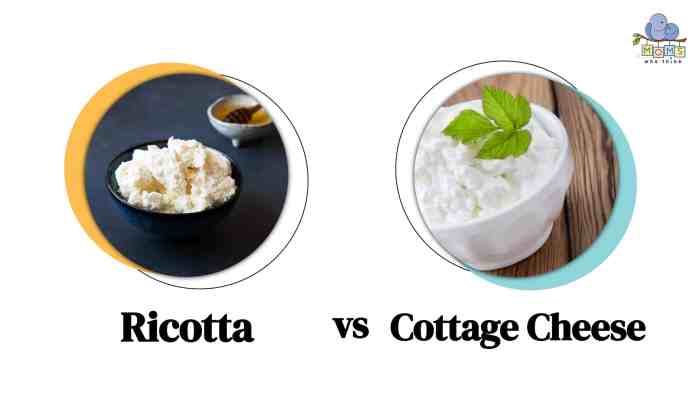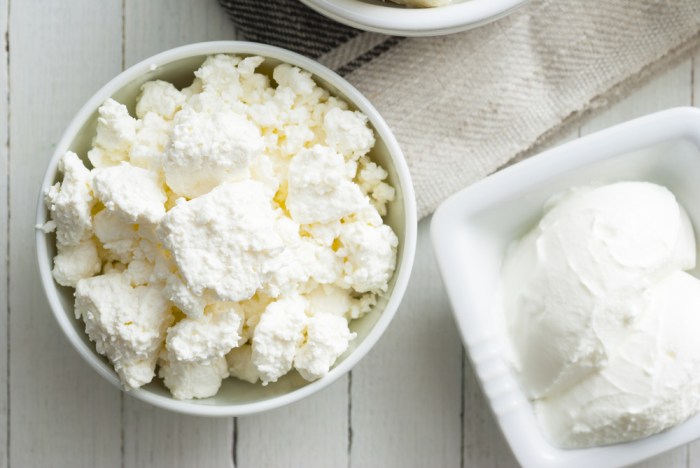Calorie and Fat Content Differences

Ricotta vs cottage cheese nutrition – So, you’re craving a creamy, dreamy dairy treat, but you’re also mindful of your waistline, right? Choosing between ricotta and cottage cheese can feel like navigating a Balinese rice paddy – lots of lush options, but you need to know which path leads to your goals. Let’s break down the calorie and fat content to help you make the best choice for your
Choosing between ricotta and cottage cheese often comes down to personal preference; ricotta’s creamier texture contrasts with cottage cheese’s tang. But for a different cheesy snack, consider the nutritional profile of cheese stick nutrition colby jack , a convenient and tasty option. Ultimately, the best choice depends on your dietary needs and what you’re craving – whether it’s the delicate ricotta or the slightly more robust cottage cheese.
santai* lifestyle.
Generally speaking, ricotta tends to pack a bit more of a caloric punch and a higher fat content compared to cottage cheese. But don’t ditch the ricotta just yet! The differences aren’t always drastic, and it depends on the specific brand and preparation. Think of it like choosing between a luscious Nasi Goreng with extra shrimp versus a lighter, healthier Nasi Campur – both delicious, but with varying nutritional profiles.
Calorie and Fat Content Comparison
Here’s a table comparing the typical nutritional values per serving. Remember, these are averages and can vary based on the brand and fat content (whole milk, low-fat, etc.). Always check the nutrition label!
| Serving Size | Cheese Type | Calories | Fat Grams |
|---|---|---|---|
| 1/2 cup (113g) | Ricotta (whole milk) | 170-200 | 10-13 |
| 1/2 cup (113g) | Cottage Cheese (low-fat) | 80-100 | 2-5 |
Visual Representation of Calorie and Fat Differences
Imagine two glasses, both half-full. One glass represents ricotta, filled with a thicker, creamier liquid to represent the higher fat content. This glass is noticeably fuller. The other glass, representing cottage cheese, is filled with a thinner, slightly less opaque liquid. This glass is visibly less full, reflecting the lower fat and calorie content.
The difference in fullness visually represents the calorie and fat differences between the two cheeses.
Implications for Weight Management and Dietary Goals, Ricotta vs cottage cheese nutrition
The differences in calorie and fat content directly impact weight management. If you’re aiming for weight loss or maintaining a healthy weight, choosing low-fat cottage cheese over whole-milk ricotta might be a more strategic move due to its lower calorie and fat content. However, ricotta can still be incorporated into a balanced diet in moderation. Think of it like enjoying a small piece of delicious Balinese cake as a treat – enjoy it mindfully, and it won’t derail your healthy lifestyle.
Consider your overall daily caloric intake and macronutrient goals when making your selection. For example, if you’re on a low-fat diet, the lower fat content of cottage cheese will be beneficial, whereas if you’re prioritizing protein, the higher protein content of ricotta might be preferable, despite its higher fat content.
Protein Quality and Digestibility

Choosing between ricotta and cottage cheese? It’s not just about calories, babes! The protein game is strong with these two, but there are subtle differences that can impact your gains and overall well-being. Let’s dive into the protein power play.Protein quality isn’t just about the amount; it’s about the type and how easily your body can use it.
Both ricotta and cottage cheese are good sources, but their amino acid profiles and digestibility differ slightly.
Amino Acid Profiles and Digestibility
Ricotta and cottage cheese both offer a complete protein profile, meaning they contain all nine essential amino acids your body can’t produce on its own. However, the ratios of these amino acids vary. Ricotta, being made from whey and sometimes some casein, tends to have a higher proportion of whey protein, which is known for its faster digestion and absorption.
Cottage cheese, primarily made from casein, digests more slowly. This slower digestion can lead to a longer feeling of fullness. Think of it like this: ricotta is a quick burst of protein energy, perfect for a post-workout snack, while cottage cheese provides a sustained release, keeping you satisfied for longer.
Impact on Muscle Building and Repair
The difference in digestion rates between ricotta and cottage cheese has implications for muscle building and repair. The faster-digesting whey protein in ricotta provides a rapid supply of amino acids for muscle protein synthesis, making it beneficial for post-workout recovery. Casein, the main protein in cottage cheese, provides a slower, more sustained release of amino acids, which can contribute to muscle growth and repair overnight while you’re sleeping.
Imagine it like this: ricotta is the quick fix, cottage cheese is the long-term investment.
Effect on Satiety and Appetite Regulation
The protein content and digestion rate directly influence satiety – that feeling of fullness. Cottage cheese, with its high casein content and slow digestion, generally wins the satiety game. Casein forms a gel-like substance in the stomach, delaying gastric emptying and keeping you feeling full for longer. This can be particularly helpful in managing appetite and preventing overeating.
Ricotta, while still a good source of protein, may not provide the same prolonged satiety effect. Think of it like this: cottage cheese keeps the hunger pangs at bay, while ricotta is a satisfying but potentially less lasting option.
FAQ Compilation: Ricotta Vs Cottage Cheese Nutrition
Can I eat ricotta and cottage cheese if I’m lactose intolerant?
It depends on your level of intolerance. Some people with mild lactose intolerance can tolerate small amounts, while others can’t. Look for lactose-free versions if needed.
Which cheese is better for muscle growth?
Both are great for muscle growth due to their protein content. Cottage cheese often has a slightly higher protein content per serving, but the difference isn’t huge.
Are there any potential side effects from eating too much of either cheese?
Consuming excessive amounts of either could lead to digestive issues due to high fat or lactose content. Listen to your body!
Can I use ricotta and cottage cheese interchangeably in recipes?
Nope, not always! Their textures and moisture levels differ, impacting the final result. Ricotta is creamier, cottage cheese is more crumbly.
